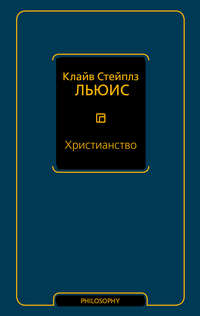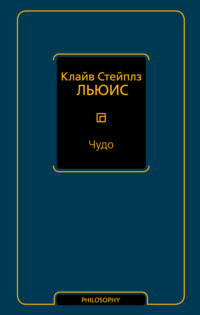
Полная версия
Christian Reflections
What is perhaps most startling in this picture is the apparent equivalence of the woman-man and man-God relation with the relation between Christ and God, or, in Trinitarian language, with the relation between the First and Second Persons of the Trinity. As a layman and a comparatively recently reclaimed apostate I have of course, no intention of building a theological system – still less of setting up a catena of New Testament metaphors as a criticism of the Nicene or the Athanasian creed, documents which I wholly accept. But it is legitimate to notice what kinds of metaphor the New Testament uses; more especially when what we are in search of is not dogma but a kind of flavour or atmosphere. And there is no doubt that this kind of proportion sum – A:B : : B:C – is quite freely used in the New Testament where A and B represent the First and Second Persons of the Trinity. Thus St Paul has already told us earlier in the same epistle that we are ‘of Christ’ and Christ is ‘of God’ (3:23). Thus again in the Fourth Gospel, Our Lord Himself compares the relation of the Father to the Son with that of the Son to His flock, in respect of knowledge (10:15) and of love (15:9).
I suggest, therefore, that this picture of a hierarchical order in which we are encouraged – though, of course, only from certain points of view and in certain respects – to regard the Second Person Himself as a step, or stage, or degree, is wholly in accord with the spirit of the New Testament. And if we ask how the stages are connected the answer always seems to be something like imitation, reflection, assimilation. Thus in Galatians 4:19, Christ is to be ‘formed’ inside each believer – the verb here used

These passages, you will notice, are all Pauline; but there is a place in the Fourth Gospel which goes much further – so far that if it were not a Dominical utterance we would not venture to think along such lines. There (5:19) we are told that the Son does only what He sees the Father doing. He watches the Father’s operations and does the same

Now it may be that there is no absolute logical contradiction between the passages I have quoted and the assumptions of modern criticism: but I think there is so great a difference of temper that a man whose mind was at one with the mind of the New Testament would not, and indeed could not, fall into the language which most critics now adopt. In the New Testament the art of life itself is an art of imitation: can we, believing this, believe that literature, which must derive from real life, is to aim at being ‘creative’, ‘original’, and ‘spontaneous’? ‘Originality’ in the New Testament is quite plainly the prerogative of God alone; even within the triune being of God it seems to be confined to the Father. The duty and happiness of every other being is placed in being derivative, in reflecting like a mirror. Nothing could be more foreign to the tone of scripture than the language of those who describe a saint as a ‘moral genius’ or a ‘spiritual genius’ thus insinuating that his virtue or spirituality is ‘creative’ or ‘original’. If I have read the New Testament aright, it leaves no room for ‘creativeness’ even in a modified or metaphorical sense. Our whole destiny seems to lie in the opposite direction, in being as little as possible ourselves, in acquiring a fragrance that is not our own but borrowed, in becoming clean mirrors filled with the image of a face that is not ours. I am not here supporting the doctrine of total depravity, and I do not say that the New Testament supports it; I am saying only that the highest good of a creature must be creaturely – that is, derivative or reflective – good. In other words, as St Augustine makes plain (De Civ. Dei 12, cap. 1), pride does not only go before a fall but is a fall – a fall of the creature’s attention from what is better, God, to what is worse, itself.
Applying this principle to literature, in its greatest generality, we should get as the basis of all critical theory the maxim that an author should never conceive himself as bringing into existence beauty or wisdom which did not exist before, but simply and solely as trying to embody in terms of his own art some reflection of eternal Beauty and Wisdom. Our criticism would therefore from the beginning group itself with some existing theories of poetry against others. It would have affinities with the primitive or Homeric theory in which the poet is the mere pensioner of the Muse. It would have affinities with the Platonic doctrine of a transcendent Form partly imitable on earth; and remoter affinities with the Aristotelian doctrine of

But here some distinctions must be made. I spoke just now of the ancient idea that the poet was merely the servant of some god, of Apollo, or the Muse; but let us not forget the highly paradoxical words in which Homer’s Phemius asserts his claim to be a poet:

‘I am self-taught; a god has inspired me with all manner of songs.’ It sounds like a direct contradiction. How can he be self-taught if the god has taught him all he knows? Doubtless because the god’s instruction is given internally, not through the senses, and is therefore regarded as part of the Self, to be contrasted with such external aids as, say, the example of other poets. And this seems to blur the distinction I am trying to draw between Christian imitation and the ‘originality’ praised by modern critics. Phemius obviously claims to be original, in the sense of being no other poet’s disciple, and in the same breath admits his complete dependence on a supernatural teacher. Does not this let in ‘originality’ and ‘creativeness’ of the only kind that have ever been claimed?
If you said: ‘The only kind that ought to have been claimed’, I would agree; but as things are, I think the distinction remains, though it becomes finer than our first glance suggested. A Christian and an unbelieving poet may both be equally original in the sense that they neglect the example of their poetic forebears and draw on resources peculiar to themselves, but with this difference. The unbeliever may take his own temperament and experience, just as they happen to stand, and consider them worth communicating simply because they are facts or, worse still, because they are his. To the Christian his own temperament and experience, as mere fact, and as merely his, are of no value or importance whatsoever: he will deal with them, if at all, only because they are the medium through which, or the position from which, something universally profitable appeared to him. We can imagine two men seated in different parts of a church or theatre. Both, when they come out, may tell us their experiences, and both may use the first person. But the one is interested in his seat only because it was his – ‘I was most uncomfortable,’ he will say. ‘You would hardly believe what a draught comes in from the door in that corner. And the people! I had to speak pretty sharply to the woman in front of me.’ The other will tell us what could be seen from his seat, choosing to describe this because this is what he knows, and because every seat must give the best view of something. ‘Do you know,’ he will begin, ‘the moulding on those pillars goes on round at the back. It looks, too, as if the design on the back were the older of the two.’ Here we have the expressionist and the Christian attitudes towards the self or temperament. Thus St Augustine and Rousseau both write Confessions; but to the one his own temperament is a kind of absolute (au moins je suis autre), to the other it is ‘a narrow house too narrow for Thee to enter – oh make it wide. It is in ruins – oh rebuild it.’ And Wordsworth, the romantic who made a good end, has a foot in either world and though he practises both, distinguishes well the two ways in which a man may be said to write about himself. On the one hand he says:
[For] I must tread on shadowy ground, must sink
Deep, and aloft ascending breathe in worlds
To which the heaven of heavens is but a veil. *
On the other he craves indulgence if
with this
I mix† more lowly matter; with the thing
Contemplated, describe the Mind and Man
Contemplating; and who and what he was –
The transitory being that beheld
The vision. ‡
In this sense, then, the Christian writer may be self-taught or original. He may base his work on the ‘transitory being’ that he is, not because he thinks it valuable (for he knows that in his flesh dwells no good thing), but solely because of the ‘vision’ that appeared to it. But he will have no preference for doing this. He will do it if it happens to be the thing he can do best; but if his talents are such that he can produce good work by writing in an established form and dealing with experiences common to all his race, he will do so just as gladly. I even think he will do so more gladly. It is to him an argument not of strength but of weakness that he should respond fully to the vision only ‘in his own way’. And always, of every idea and of every method he will ask not ‘Is it mine?’, but ‘Is it good?’
This seems to me the most fundamental difference between the Christian and the unbeliever in their approach to literature. But I think there is another. The Christian will take literature a little less seriously than the cultured Pagan: he will feel less uneasy with a purely hedonistic standard for at least many kinds of work. The unbeliever is always apt to make a kind of religion of his aesthetic experiences; he feels ethically irresponsible, perhaps, but he braces his strength to receive responsibilities of another kind which seem to the Christian quite illusory. He has to be ‘creative’; he has to obey a mystical amoral law called his artistic conscience; and he commonly wishes to maintain his superiority to the great mass of mankind who turn to books for mere recreation. But the Christian knows from the outset that the salvation of a single soul is more important than the production or preservation of all the epics and tragedies in the world: and as for superiority, he knows that the vulgar, since they include most of the poor, probably include most of his superiors. He has no objection to comedies that merely amuse and tales that merely refresh; for he thinks like Thomas Aquinas ipsa ratio hoc habet ut quandoque rationis usus intercipiatur. We can play, as we can eat, to the glory of God. It thus may come about that Christian views on literature will strike the world as shallow and flippant; but the world must not misunderstand. When Christian work is done on a serious subject there is no gravity and no sublimity it cannot attain. But they will belong to the theme. That is why they will be real and lasting – mighty nouns with which literature, an adjectival thing, is here united, far over-topping the fussy and ridiculous claims of literature that tries to be important simply as literature. And a posteriori it is not hard to argue that all the greatest poems have been made by men who valued something else much more than poetry – even if that something else were only cutting down enemies in a cattle-raid or tumbling a girl in a bed. The real frivolity, the solemn vacuity, is all with those who make literature a self-existent thing to be valued for its own sake. Pater prepared for pleasure as if it were martyrdom.
Now that I see where I have arrived a doubt assails me. It sounds suspiciously like things I have said before, starting from very different premises. Is it King Charles’s Head? Have I mistaken for the ‘vision’ the same old ‘transitory being’ who, in some ways, is not nearly transitory enough? It may be so: or I may, after all, be right. I would rather be right if I could; but if not, if I have only been once more following my own footprints, it is the sort of tragi-comedy which, on my own principles, I must try to enjoy. I find a beautiful example proposed in the Paradiso (XXVIII) where poor Pope Gregory, arrived in Heaven, discovered that his theory of the hierarchies, on which presumably he had taken pains, was quite wrong. We are told how the redeemed soul behaved; ‘di sè medesmo rise’. It was the funniest thing he’d ever heard.
Конец ознакомительного фрагмента.
Текст предоставлен ООО «ЛитРес».
Прочитайте эту книгу целиком, купив полную легальную версию на ЛитРес.
Безопасно оплатить книгу можно банковской картой Visa, MasterCard, Maestro, со счета мобильного телефона, с платежного терминала, в салоне МТС или Связной, через PayPal, WebMoney, Яндекс.Деньги, QIWI Кошелек, бонусными картами или другим удобным Вам способом.








